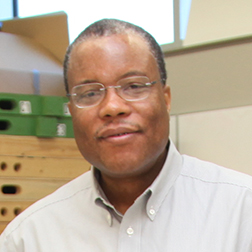
Department Mechanical Engineering at the
FAMU-FSU College of Engineering.
A Florida State University engineering professor has received a prestigious honor from the Black Engineer of the Year Awards (BEYA) for his work in educating students and building the Department of Mechanical Engineering at the FAMU-FSU College of Engineering.
Emmanuel Collins, chair of the Department Mechanical Engineering, received the Black Engineer of the Year Award: 2015 College-Level Promotion of Education.
“It’s a great honor, and it brings more visibility to the department and college,” Collins said.
African Americans make up about 13 percent of the U.S. population, but only earn about 5.2 percent of engineering degrees awarded to U.S. citizens, according to BEYA. The purpose of BEYA is to shed light on the underrepresentation of minorities in STEM fields and to honor successful and talented scientists.
“Emmanuel Collins leads one of the top engineering programs in the College of Engineering and has been very effective in generating interest in STEM among women, racial and ethnic minorities,” said Yaw Yeboah, dean of the College of Engineering. “His greatest impact has been in the production of minority and female engineering doctoral students.”
Collins is the John H. Seely Professor of Mechanical Engineering and the director of the Center for Intelligent Systems, Control and Robotics (CISCOR). He received his doctorate in aeronautics and astronautics at Purdue University and also earned degrees from Morehouse College and the Georgia Institute of Technology. He worked at Harris Corporation prior to joining the College of Engineering in 1994.
Among Collins’ accomplishments is serving as director of the FSU chapter of the Florida-Georgia Alliance for Minority Participation Program, which aims to increase retention of minority students in STEM graduate programs.
In addition to his work with College of Engineering students, he has led extensive community outreach efforts to interest local elementary, middle and high school students in science. CISCOR has worked with SAIL High School’s robotics team and has held multiple campus workshops and camps for local students interested in science.




